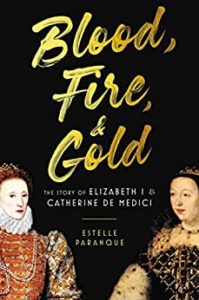Even if you’ve read a dozen books about Elizabeth I, you might enjoy this study of the Tudor queen and her decades-long rival Catherine de Medici, Queen of France for over a decade and Queen Mother to Francis II, Charles IX, and Henry III. The two most powerful women in sixteenth-century Europe, both queens were highly educated and masterful stateswomen. They learned while young how to navigate dangerous royal courts and religious turmoil, how to stay strong but outwardly pliant when necessary, and how to deal with demanding, powerful men in a world where they would be in the minority as women of power. Both survived dizzying plots, war, and shifting allegiances “while enemies hid around every corner.”
The dual biography deftly charts the twisting European alliances that could shift with a marriage as well as a treaty or just the threat of war, and demonstrates what excellent politicians both queens were as they maintained and expanded their power. Mary Queen of Scots is the perennial wild card for each queen, and the book’s best surprise is its focus on the fascinating trials and tribulations of an English ambassador to France, Sir Nicolas Throckmorton, who frequently begged to be released from his dangerous and demanding post but was unafraid to speak plainly to the Queen Mother.
I wish the book had been more thoroughly copy edited. That would have eliminated readers being told three times in a short space that Thomas Cramner was Archbishop of Canterbury and that Frances II was nine years old two paragraphs apart. Or having to look up the translation of the French title of a religious work that Elizabeth gave us a gift even though it was highly controversial in France. Paranque says nothing at all about the controversy. And good copy editing would have eliminated repetitious diction as well as odd phrasing like “appease tensions” in place of “ease tensions.” Some long conversations during negotiations between England and France could also have been summarized.
Paranque is no Alison Weir, Leanda de Lisle or Dan Jones, and the book doesn’t quite live up to the jazzy title. But there are some good stories here, like the gruesome joust that wounded France’s King Henry II, Catherine’s husband, and led to his miserable death. The intervention of a famed surgeon is an unforgettable classic of bizarre medical practice in that period. Even more fascinating is elderly Elizabeth’s interview with a French envoy, dripping with jewels in her gorgeous dressing gown, bosom exposed, a picture of sad ruin and abiding grace.
Lev Raphael has been reading about the Tudors since elementary school. He has reviewed books for The Washington Post, The Detroit Free Press, Jerusalem Report and three public radio stations. He hosted an interview show where guests included Salman Rushdie and Erica Jong.

